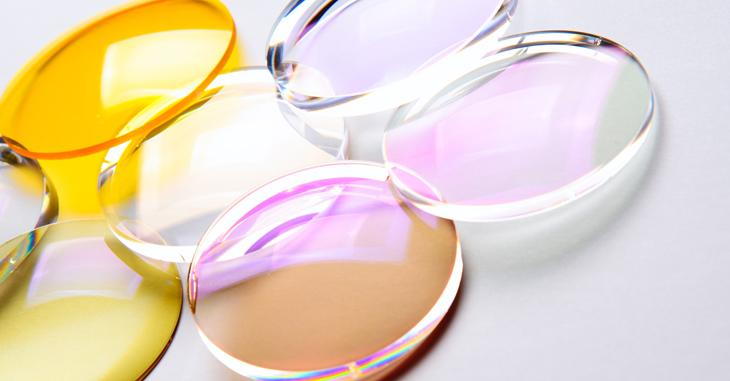Location

Today's eyeglasses are trendy accessories, but your eyes may need some time to acclimate to prescription lenses. This is especially true if you've never worn glasses before. New eyeglasses can contribute to headaches, dizziness, and even nausea for those not used to corrective lenses. But if you try these simple tips for adjusting to your sparkling new vision, you can make the transition that much easier.
Have Your New Frames Fitted by a Professional
If this is your first pair of eyeglasses, don't just take them from the eye associate and walk out the door. Most vision centers will ask you to take a seat, so they can professionally fit your frames. But if yours doesn't, ask for a fitting. Glasses that don't fit properly can make your ears hurt or slide down your nose incessantly. They may also leave indentations on the sides of your face and make your head ache.
A professional fitting only takes a few minutes, but it can mean the difference between loving your new eyeglasses and hating them. The first tip for learning how to wear glasses is to make sure they fit the way they should.
Wear Your New Glasses More and More Each Day
It's usually good to start out slowly with new glasses. Try wearing them for an hour or two at a time and then taking a break. In this way, your eyes have time to adjust to the corrected vision, and problems such as vertigo and nausea may be reduced.
As you become better adjusted, you'll be able to increase the amount of time you’re able to wear glasses comfortably. Eventually, you won't even notice you have them on.
Keep Your New Lenses Clean and Bright

Smudges, dirt, or fingerprints mar your lenses, making them difficult to see through. They're also annoying. Keep your new eyeglasses clean by handling them by the frames instead of the lenses. Store them in a proper eyeglass case, and wash them frequently, according to the directions provided by your vision center. There are several proper methods:
Use your fingers, warm water, and dish detergent to work up a mild lather to clean your lenses. Afterward, rinse with clean water, and wipe dry with a soft, microfiber cloth.
Spray both sides of your lenses gently with eyeglass cleaner, and wipe dry with a clean, soft cloth or tissue.
Use pre-moistened wipes to wipe off lenses.
You should also avoid setting your new eyeglasses face-down on the lenses to avoid scratches. When you take them off, place them in a soft storage case and store them safely in a drawer.
Don't Switch Back and Forth Between Old and New Lenses
Once you've obtained a new prescription, put your old glasses away or consider donating them to others in need. If you switch back and forth between your old glasses and your new ones, it may cause eye strain or headache. And, if you're attached to your old frames, consider re-purposing them to fit your new lenses.
Have Your Prescription Adjusted
You'll usually be able to adapt to new eyeglasses within a few days, after which you'll stop noticing them altogether. But it may take up to two weeks to completely transition. During this time, you should wear your new glasses as much as possible. And if problems persist, and objects appear out-of-proportion or misshapen, you may need to return to your eye doctor to have your prescription adjusted.
Take an Over-the-Counter Pain Reliever
First days with new glasses can be nauseating, especially if you're at work or at school. If you begin noticing symptoms, take an OTC pain reliever early on to stave off the decline. If you get out ahead of them in time, the symptoms may disappear instead of worsening.
Ask About Coatings

Your vision center can apply coatings to your new glasses that make them perform better in outdoor light or other conditions. Ask about coatings such as:
- UV Blockers
- Anti-Fog
- Anti-Glare
- Photochromic
- Scratch-Resistant
These coatings can help protect your eyes from the rays of the sun, prolonged computer usage, and more, making them much easier to wear for long periods of time.
These simple tips will help ease your transition into new eyeglasses, preventing common problems such as dizziness or migraine, and they'll make your new glasses feel less like they're in the way.

Today's eyeglasses are trendy accessories, but your eyes may need some time to acclimate to prescription lenses. This is especially true if you've never worn glasses before. New eyeglasses can contribute to headaches, dizziness, and even nausea for those not used to corrective lenses. But if you try these simple tips for adjusting to your sparkling new vision, you can make the transition that much easier.
Have Your New Frames Fitted by a Professional
If this is your first pair of eyeglasses, don't just take them from the eye associate and walk out the door. Most vision centers will ask you to take a seat, so they can professionally fit your frames. But if yours doesn't, ask for a fitting. Glasses that don't fit properly can make your ears hurt or slide down your nose incessantly. They may also leave indentations on the sides of your face and make your head ache.
A professional fitting only takes a few minutes, but it can mean the difference between loving your new eyeglasses and hating them. The first tip for learning how to wear glasses is to make sure they fit the way they should.
Wear Your New Glasses More and More Each Day
It's usually good to start out slowly with new glasses. Try wearing them for an hour or two at a time and then taking a break. In this way, your eyes have time to adjust to the corrected vision, and problems such as vertigo and nausea may be reduced.
As you become better adjusted, you'll be able to increase the amount of time you’re able to wear glasses comfortably. Eventually, you won't even notice you have them on.
Keep Your New Lenses Clean and Bright

Smudges, dirt, or fingerprints mar your lenses, making them difficult to see through. They're also annoying. Keep your new eyeglasses clean by handling them by the frames instead of the lenses. Store them in a proper eyeglass case, and wash them frequently, according to the directions provided by your vision center. There are several proper methods:
Use your fingers, warm water, and dish detergent to work up a mild lather to clean your lenses. Afterward, rinse with clean water, and wipe dry with a soft, microfiber cloth.
Spray both sides of your lenses gently with eyeglass cleaner, and wipe dry with a clean, soft cloth or tissue.
Use pre-moistened wipes to wipe off lenses.
You should also avoid setting your new eyeglasses face-down on the lenses to avoid scratches. When you take them off, place them in a soft storage case and store them safely in a drawer.
Don't Switch Back and Forth Between Old and New Lenses
Once you've obtained a new prescription, put your old glasses away or consider donating them to others in need. If you switch back and forth between your old glasses and your new ones, it may cause eye strain or headache. And, if you're attached to your old frames, consider re-purposing them to fit your new lenses.
Have Your Prescription Adjusted
You'll usually be able to adapt to new eyeglasses within a few days, after which you'll stop noticing them altogether. But it may take up to two weeks to completely transition. During this time, you should wear your new glasses as much as possible. And if problems persist, and objects appear out-of-proportion or misshapen, you may need to return to your eye doctor to have your prescription adjusted.
Take an Over-the-Counter Pain Reliever
First days with new glasses can be nauseating, especially if you're at work or at school. If you begin noticing symptoms, take an OTC pain reliever early on to stave off the decline. If you get out ahead of them in time, the symptoms may disappear instead of worsening.
Ask About Coatings

Your vision center can apply coatings to your new glasses that make them perform better in outdoor light or other conditions. Ask about coatings such as:
- UV Blockers
- Anti-Fog
- Anti-Glare
- Photochromic
- Scratch-Resistant
These coatings can help protect your eyes from the rays of the sun, prolonged computer usage, and more, making them much easier to wear for long periods of time.
These simple tips will help ease your transition into new eyeglasses, preventing common problems such as dizziness or migraine, and they'll make your new glasses feel less like they're in the way.
LOCATION
Office Hours
Monday
9:00 am - 5:00 pm
Tuesday
9:00 am - 5:00 pm
Wednesday
9:00 am - 5:00 pm
Thursday
9:00 am - 5:00 pm
Friday
9:00 am - 5:00 pm
Saturday
11:00 am - 2:00 pm
Sunday
Closed

